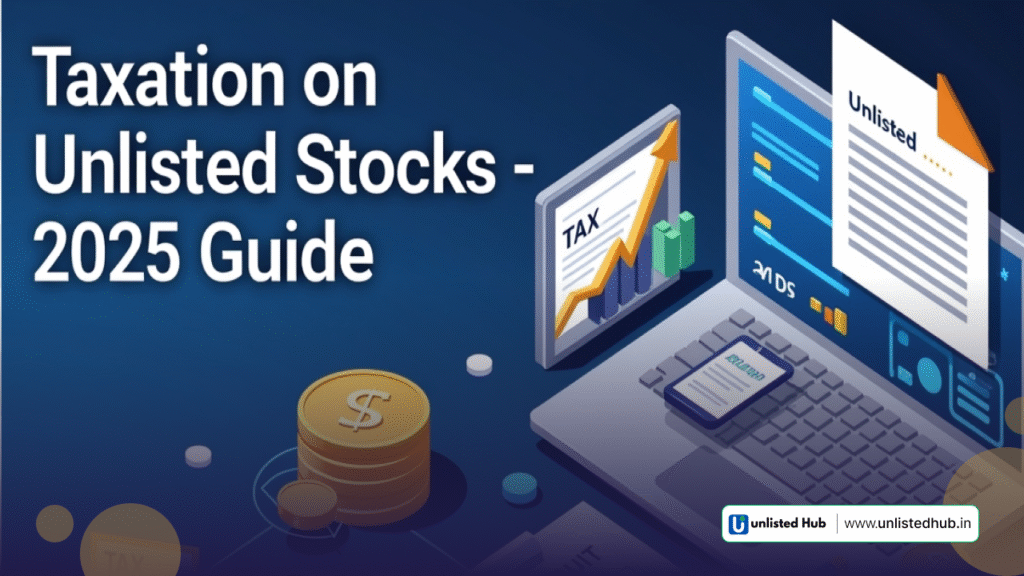Introduction
In recent years, Unlisted Share investments have gained strong interest among investors seeking early access to high-growth companies before they go public. These shares belong to companies that are not listed on formal stock exchanges like NSE or BSE, and are traded privately through agents, online platforms, or direct placements. Investing in Unlisted Share can offer significant rewards, especially when the businesses eventually launch their IPOs. However, they also carry higher risks due to limited transparency, illiquidity, and valuation challenges. This blog explores the top unlisted shares in India, how to buy and sell them, their potential benefits, and upcoming IPOs from promising unlisted groups in 2025.
What is an Unlisted Share?
Unlisted share are shares of groups that aren’t listed on any stock exchange, such as the NSE or BSE. These stocks are normally traded via private placements or over-the-counter (OTC) markets. Companies issuing unlisted shares are regularly startups, non-public companies, or the ones making plans to go public in the future. While unlisted stocks provide early funding opportunities and capacity excessive returns, they also come with higher risk and lower liquidity. Investors should depend on employer reports and third-party Analyses for due diligence. These shares are perfect for long-term buyers looking to diversify their portfolio with high-growth assets.
Characteristics of Unlisted Shares
1. Limited Liquidity:
- Unlike listed stocks, which may be bought or sold quickly through stock exchanges, unlisted stocks have limited liquidity. Buying or marketing these shares often involves non-public negotiations between customers and dealers.
2. Evaluation Challenges:
- Since loosening agencies do not need to show their economic performance in a similarly listed way, it may be more complicated to evaluate the internal costs of these shares and rely on the organizational report, financial analysis, or 1/three-characteristics.
3. Regulatory Oversight:
- Although unlisted stocks aren’t regulated by way of the use of stock exchanges, they, however, come beneath the purview of the Securities and Exchange Board of India (SEBI) and the Companies Act, 2013, ensuring a few degrees of governance.
4. High Risk, High Reward:
- Investing in unlisted stocks may be risky due to decreased transparency and uncertain exit opportunities. However, similarly, they provide the capability for high returns, in particular if the agency finally receives listing and plays properly, submitting an IPO.
How to Buy Unlisted Share?
Unlisted share are shares in companies that are not indexed in the stock markets such as NSE or BSE. These are usually non-public agencies or startups that can plan to launch their listing (first public offers) inside fate. Buying unrest shares can be a terrible way to invest early in rapidly growing groups. Here’s a simple Step-neck-stage guide that helps you buy: How to buy them:
1. Learn about the company:
- Before you act after turmoil, you know about the first company. Check their commercial companies, how they make money, which drives it and what their future plans are. This is important because the turmoil does not share as much data as the indexed, so you should do a little more homework.
2. Find where you can buy:
You can buy unrest shares:
- Online platforms that deal with Unlisted Shares (eg Sharescart, Stockife, Altius Investech)
- Stockbroker: who specialize in unlisted shares
- Agency employee or current shareholder (if allowed)
- Make sure you choose a reliable platform or broker to stay away from fraud.
3. Check the price:
- Unlisted Shares do not have a fixed interest rate as an listed stock. This price is usually determined on the basis of how well the agency is, and the number of people who want to buy or sell shares. You can also try to interact with the price with the seller.
4. Complete KYC and Make Payment
- Before you can buy shares, you will eliminate KYC (know your customer) by providing the PAN card, Aadhaar and bank information. Then pay volume through the transfer of financial institutions, and shares can be transferred to your Demat account.
5. Hold and Track
- Once you get the shares, preserve them in your Demat account and hold an eye on the company’s performance. If the enterprise does well or goes for an IPO, the price of your shares can grow.
How to Sell Unlisted Shares
Unlisted share are stocks of groups that are not listed on any stock exchange. These shares are frequently held via early shoppers, personnel, or promoters of personal agencies or startups. Selling unlisted stocks can be pretty distinctive from promoting listed stocks, particularly due to the dearth of a public market and constrained liquidity. If you are protecting unlisted stocks and need to sell them, here’s a clean and simple guide to help you through the technique.
1. Check the Company’s Share Transfer Policy
- Before beginning the sale, take a look at if the employer has any particular regulations or methods for transferring unlisted shares. Many private companies have regulations approximately who should buy shares, regularly requiring approval from the enterprise’s board or present shareholders. Some companies have a proper first refusal clause, which means existing shareholders get the primary right to buy the stocks you need to sell.
2. Find a Buyer
Unlike listed shares, unlisted stocks do not have a market in which you can virtually promote your stocks. You need to find a customer through:
- Personal contacts along with pals, own family, or enterprise buddies
- Online unlisted share buying and selling structures like Sharescart, Altius Investech, or Stockify
- Brokers who concentrate on unlisted securities
- Make sure to verify the credibility of the client to avoid fraud.
3. Agree on the Price
- Since unlisted stocks are not publicly traded, the rate isn’t always fixed and is normally determined via negotiation between the seller and the client. The valuation might also depend on the business enterprise’s latest financial performance, closing funding spherical, or market demand for the stocks.
4. Complete KYC and Documentation
- Both the vendor and patron need to finish their KYC (Know Your Customer) formalities, which entail filing identity documents and providing proof. You may even need to signal a percentage switch settlement or different applicable documents as according to the enterprise’s hints.
5. Transfer Shares to Buyer’s Demat Account
- Shares are held in a Demat account, so after completing the payment, the shares must be transferred electronically out of your Demat account to the client’s Demat account thru your Depository Participant (DP). The organization may want to replace its proportion check in.
6. Inform the Company
- After the transfer, inform the organization to replace its records. This step is essential to ensure that the consumer will become the reputable shareholder.
Is It Safe to Buy Unlisted Shares?
Investing in unlisted shares has turned out to be increasingly more popular, especially amongst investors seeking to get early access to excessive-boom non-public organizations. But a common question many people ask is: “Is it secure to buy unlisted shares?” The answer depends on several elements, including your funding understanding, hazard urge for food, and the credibility of the corporation you’re investing in.
Understand risks:
- Unrestrained stock is not traded on stock exchanges such as the NSE or the BSE. This technique cannot be a marketplace every day to buy or market these shares, making them very little fluid. If you need to sell your shares later, it may take time to find a buyer.
- Another threat is loss of transparency. Listed agencies are required to put up quarterly economic effects and observe strict regulatory policies. Unlisted agencies, on the other hand, don’t usually offer everyday updates or targeted disclosures, making it tougher for buyers to evaluate the organization’s performance.
- There is also the threat of charge volatility and valuation issues. Since prices aren’t decided with the resources of the open marketplace, they’re commonly primarily based on negotiations or estimates, which can also or may not replicate the right cost of the business enterprise.
Potential Rewards:
- Despite these dangers, unlisted shares can offer excessive returns if the employer plays properly and goes public inside the future. Many successful businesses like Paytm, Zomato, and Nykaa had been once unlisted. Investors who supplied stocks earlier than their IPOs frequently noticed massive profits after listing.
- Unlisted stocks also give you a risk to be part of new-age startups or high-growth companies earlier than they grow to be popular in the public marketplace.
How to Stay Safe:
- If you are making plans to invest in unlisted stocks, comply with those steps to stay secure:
- Do thorough studies at the enterprise, its promoters, and financials.
- Buy through trusted platforms or brokers who specialise in unlisted shares.
- Invest a small part of your portfolio in unlisted shares to lessen the risk.
- Check legal documents and ownership evidence earlier than completing the transaction.
Top 10 Unlisted Share in Market
Investing in unlisted stocks offers a completely unique opportunity to end up an early stake holder in high-capacity businesses earlier than they go public. In 2025, numerous Indian corporations throughout diverse sectors are garnering interest inside the unlisted marketplace due to their robust financials, innovative commercial enterprise fashions, and capacity for great boom. Here’s an in depth look at the pinnacle 10 unlisted shares to look at in 2025:
1. National Stock Exchange (NSE)
- Sector: Financial Services
- Valuation: ₹four.7 lakh crore
- Unlisted Share Price: Approximately ₹2,2 hundred
- P/E Ratio: 44x
- IPO Status: Anticipated
The NSE stands as India’s maximum precious unlisted agency and ranks as the fifth-biggest inventory trade globally. With a market capitalization of ₹4.7 lakh crore, its unlisted shares have seen good sized investor interest, reflecting its dominant role within the Indian monetary market.
2. HDB Financial Services
- Sector: Non-Banking Financial Company (NBFC)
- Unlisted Share Price: Approximately ₹685
- IPO Status: SEBI-permitted; plans to elevate ₹12,500 crore
A subsidiary of HDFC Bank, HDB Financial Services specializes in imparting various monetary products and services. The business enterprise has received approval from the Securities and Exchange Board of India (SEBI) to raise ₹12,500 crore through a clean issue of stocks, underscoring its growth targets.
3. API Holdings (PharmEasy)
- Sector: Healthcare Technology
- Revenue (FY23): ₹6,702 crore
- Net Profit (FY23): ₹5,983 crore
- Unlisted Share Price: Approximately ₹ 11
- IPO Status: Expected
API Holdings, the determining corporation of PharmEasy, has been instrumental in revolutionizing the virtual healthcare panorama in India. With extraordinary financials and a huge client base, the agency is nicely placed for a potential IPO, providing traders a risk to be part of India’s burgeoning health-tech area.
4. Razorpay
- Sector: Fintech
- Valuation: ₹sixty three,620 crore
- Revenue (FY23): ₹2,501 crore
- Return on Equity (ROE): 2.Seventy seven%
- IPO Status: Planned inside 2–3 years
Razorpay has emerged as a primary fee solutions issuer in India, facilitating seamless transactions for companies all through the use of a. The organization’s constant income boom and strategic tasks role it as a robust contender in the fintech space, with plans for an IPO inside the near future.
5. OYO
- Sector: Hospitality
- EBITDA (FY24): ₹877 crore
- Net Profit (FY24): ₹141.2 crore
- IPO Status: Expected
OYO, a global hospitality chain, has confirmed a considerable turnaround by way of achieving profitability in FY24. With a big community of hotels and houses throughout more than one nation, OYO’s asset-slight business enterprise model and strategic expansions make it an attractive investment opportunity before its anticipated IPO.
6. Vikram Solar
- Sector: Renewable Energy
- Profit After Tax (FY24): ₹seventy nine.7 crore
- EBITDA Margin Improvement: 15%
- IPO Status: SEBI-legal; goals to elevate ₹1,500 crore
As a number one solar photovoltaic module producer in India, Vikram Solar is at the main edge of the United State’s smooth power transition. The strong economic regular general performance and operational general performance of the Enterprise employer emphasized his ability to increase, making it a remarkable candidate for curious buyers about locations for renewable power.
9. Project Green Energy
- Sector: Renewable Energy (Solar EPC)
- IPO status: Draft Red Herring Prospectus (DRHP) entered into SEBI
Located in Ahmedabad, Projeel Green Energy is doing a fort in Sun Engineering, Procurement and Manufacturing (EPC) Prasad. Recognized with the aid of the usage of CRISIL as one of the top-performing renewable energy companies in India, Prozeal’s willpower to sustainable electricity solutions positions it as a promising investment in the inexperienced power vicinity.
8. Skyroot Aerospace
- Sector: Aerospace and Space Technology
- Funding Raised: $90 five million
- Major Milestone: First Indian private company organization to acquire outer vicinity
Skyroot Aerospace has made large strides in India’s non-public region, notably turning into the primary Indian private agency to achieve outer vicinity. With extensive funding and plans to set up a rocket production facility in Telangana, Skyroot is poised to play a pivotal role inside the USA .’s location exploration endeavors.
9. Pixxel
- Sector: Space Technology.
- Funding Raised: $95million.
- Notable Achievement: Secured a NASA settlement for hyperspectral Earth observation generation.
Pixxel is pioneering the improvement of a constellation of hyperspectral imaging satellites, aiming to offer advanced Earth observation statistics. With full-size funding and worldwide collaborations, consisting of an agreement with NASA, Pixxel represents a completely unique investment possibility within the area-tech quarter.
10. Chennai Super Kings (CSK)
- Sector: Sports and Entertainment
- Revenue (FY23): ₹292 crore
- Net Profit (FY23): ₹52 crore
- Unlisted Share Price: Approximately ₹180
Chennai Super Kings, one of the most popular franchises in the Indian Premier League (IPL), presents buyers a chance to be part of India’s thriving sports activities and amusement industry. With a large fan base and Continuous on field performance, CSK’s unlisted stocks have become increasingly attractive to investors spread investments.

Upcoming IPO from the Unlisted Company
In 2025, India’s capital markets are poised for a first rate influx of Initial Public Offerings (IPOs) from distinguished unlisted businesses at some point of numerous sectors. These upcoming IPOs gift buyers with opportunities to interact with hastily growing groups transitioning to public possession. Here’s a definition of a few upcoming unlisted companies making plans to go public this year:
1. HDB Financial Services
- Sector: Non-Banking Financial Company (NBFC)
- IPO Size: ₹12,500 crore
- Status: SEBI-approved
A subsidiary of HDFC Bank, HDB Financial Services has received approval from the Securities and Exchange Board of India (SEBI) to elevate ₹12,500 crore through a smooth hassle of shares. This glide underscores its increased dreams and the capability for customers to take part in its enlargement.
2. Vikram Solar
- Sector: Renewable Energy
- IPO Size: ₹1,500 crore
- Status: SEBI-authorized
Vikram Solar, a main sun photovoltaic module manufacturer in India, has acquired SEBI’s approval to raise ₹1,500 crore through an preliminary public imparting. The organization’s strong financial traditional normal overall performance and operational general performance underscore its potential for increase, making it a noteworthy candidate for traders interested in the renewable power place.
3. Ather Energy
- Sector: Electric Vehicles (EV)
- IPO Size: ₹3,100 crore
- Status: SEBI-approved
Ather Energy, an electric-powered scooter producer, has acquired SEBI’s approval for its ₹3,100 crore IPO. The business enterprise plans to use the proceeds to enlarge its manufacturing capability and spend money on research and development.
4. Zepto
- Sector: Quick Commerce
- IPO Size: $800 million to $1 billion
- Status: DRHP submitting predicted with the aid of April 2025
Zepto, a ten-minute shipping startup, is on the point of reporting its Draft Red Herring Prospectus (DRHP) with the aid of April 2025. The organization aims to raise between $800 million and $1 billion to fuel its speedy growth in the short-term sector.
5. OYO
- Sector: Hospitality
- IPO Size: $400million to $600 million
- Status: DRHP submitting expected with the aid of manner of Q1 FY26
OYO, a global hospitality chain, is making plans to record its DRHP through the usage of the end of Q1 FY26, focused on a valuation of as much as $5 billion. This comes after the company withdrew its IPO documents in May 2024, marking its second try at going public.
6. Reliance Jio
- Sector: Telecommunications
- IPO Size: ₹40,000 crore
- Status: Expected in 2025
Reliance Jio, India’s principal telecom operator, is gearing up for a massive ₹40,000 crore IPO in 2025. This supply is expected to be the most critical in the United States of America’s statistics, marking a considerable milestone in India’s capital markets.
7. LG Electronics India
- Sector: Consumer Electronics
- IPO Size: ₹15,000 crore
- Status: SEBI-permitted
LG Electronics India has secured SEBI’s reputation for its ₹15,000 crore IPO, so that it can be a pure provider available on the market of over 10 crore stocks by its parent organisation, LG Electronics Inc. This move marks a fifteen% stake dilution and is poised to be one of the most outstanding client electronics listings.
8. BoAt
- Sector: Consumer Electronics
- IPO Size: ₹2,000 crore
- Status: Expected in FY26
BoAt, identified for its audio and wearable merchandise, is planning a ₹2,000 crore IPO in FY26, targeting a valuation of over $1.5 billion. The organization goals to apply the proceeds to amplify into new lifestyle segments and enhance its design and technical talents.
9. Maharashtra Natural Gas Limited (MNGL)
- Sector: Energy
- IPO Size: ₹1,000 crore
- Status: Approved with the aid of way of BPCL
MNGL, a joint task of BPCL, GAIL, and IGL, is ready to launch a ₹1,000 crore IPO. The proceeds will fund growth in the town gas distribution sector, aligning with BPCL’s strategy to capitalize on the developing smooth electricity market.
10. Ullu Digital
- Sector: OTT-streaming
- IPO size: ₹135 crore to ₹150 crores
- Status: DRHP filed in February 2024
An OTT streaming platform Ulu submitted its DRHP in February 2024 for a listing on the BSE SME platform. IPO will contain a single problem of 62.63 Lakh shares, aiming between ₹135 crore and ₹150.
Conclusion
Unlisted stocks offer a completely unique opportunity for early investment in some of India’s most promising non-public corporations, lots of which are on the point of going public. With names like NSE, OYO, Razorpay, and Ather Energy anticipated to release IPOs soon, the unlisted market continues to attract serious interest from savvy buyers. While the rewards can be extensive, especially when timed properly earlier than an IPO, the associated dangers cannot be neglected. Proper research, depending on systems, and a varied method are key. For buyers willing to take a calculated risk, unlisted shares should offer lengthy-time period prices and fantastic returns within the evolving economic landscape.
Disclaimer: This article is for informational purposes only. Please consult a financial advisor before making any investment decisions.






Do you have any video of that? I’d love to find out more details.
No I don’t have it by we are posting it in a content form on every platform so please Visit it
Thank you a bunch for sharing this with all people you
actually understand what you are talking approximately!
Bookmarked. Please also visit my website =). We can have a
link change agreement between us
Thanks for your kind words. Glad you found it helpful!
Wow that was unusual. I just wrote an very long comment but after I clicked submit my comment didn’t appear.
Grrrr… well I’m not writing all that over again. Anyhow, just wanted to say wonderful blog!
Oo so sorry I Didn’t notice it, Thanks for your kind words!